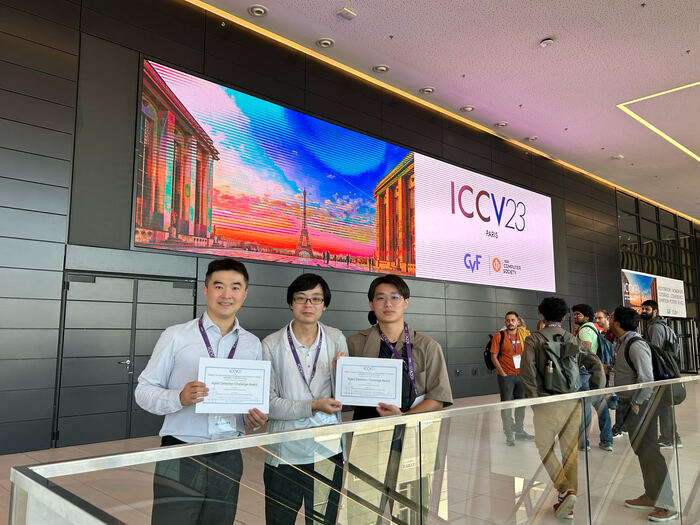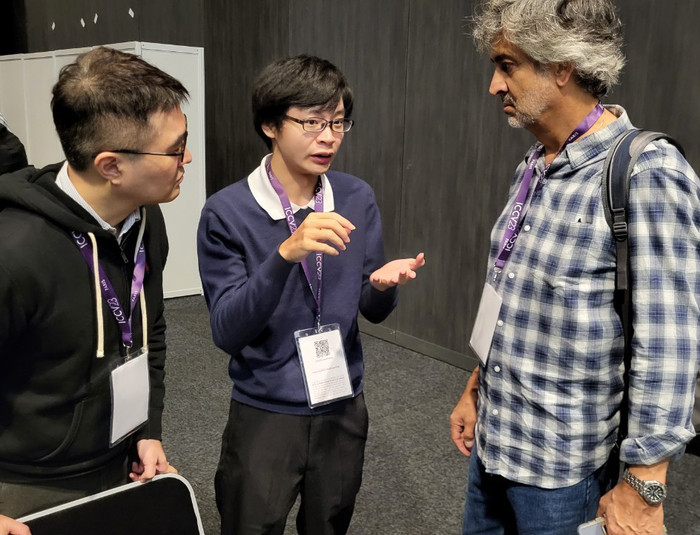National Chung Cheng University AI team wins world championship in Paris International Self-Driving ICCV2023 Competition


With the rapid growth of electric vehicles, "smart autonomous driving" has become a key
technology that’s popular and widely discussed in artificial intelligence(AI)AI) in recent years.The
Machine Vision and Learning Lab Team led by Chen-Kuo Chiang, assistant professor of
Department of Computer Science and Information Engineering at National Chung Cheng
University(AI)CCU), went to Paris on October 2nd to participate in the international self-driving
competition co-organized by the top international conference "International Conference on
Computer Vision 2023".They defeated 27 research and development teams(AI)R&D team) around
the globe and won the championship with an average detection accuracy of 17.20, which was
two times more than 8.27 of the team that won the second place.
The Research Center on AI and Sustainability of CCU stated that the goal of the international
self-driving competition is to accurately detect and predict multiple road entities including
pedestrians, vehicles, cyclists, etc. It can be viewed as a way to support the key foundation of
the reliability and autonomous safety decision-making of autonomous vehicles. This year, Road+
+ (AI)Road++ @ ICCV2023) places environmental perception on autonomous driving as the main
research and development axis.
Pao-Ann Hsiung, director of The Research Center on AI and Sustainability of CCU, said that
although the current task of teaching autonomous vehicles how to drive can be solved through
brute force or reinforcement learning methods, a better alternative is to provide the vehicle with
environmental awareness capabilities. Then, the road situation, such as entities, events and scene
analysis can be used to generate appropriate decision-making strategies automatically. In
particular, the advantage of the autonomous vehicles is that they can refer to the way humans
think in similar environments and make related AI modeling and analysis.
Dr. Chiang said that the team won the championship in the "Traffic Agent Detection in Time and
Space Domain" project in the "Situation Awareness Event Detection Competition in Autonomous
Driving". The research team had participated in more than three international smart
transportation competitions before participating in this one. They have hence accumulated a lot
of experience in AI modeling and development and came to fruition in this international
competition. Dr. Chiang mentioned they were also invited to this year's top conference ICCV to
deliver project speech due to the results of the competition. The speech also makes CCU famous
internationally.
Dr. Chiang said: "The detection of traffic agents in the competition sub-item is an object
detection problem in the time-space domain. Therefore, the average precision (AI)mAP) is used to
measure the accuracy of the model. The higher the number is, the better score the team gets. The
CCU team ranked first in the test rankings, with an mAP of 17.20, and the second, third, and
fourth teams were 8.27, 5.35, and 5.3 respectively." He said that a very good result of the model
can be seen in the accuracy gap between the CCU team and other teams.
Dr. Chiang stated that the results of this competition are based on the National Science and
Technology Council Project, "Artificial Intelligence Theme Research Project in Response to
Important National Challenges - Design of Command and Monitoring Center for Sustainable
Smart Cities", by The Research Center on AI and Sustainability of CCU. With the support of
research, the results of the competition will set the upper limit standard of the currently existing
model in the self-driving benchmark database(AI)BDB), allowing subsequent research directions to
have breakthrough goals. In addition to that, it took a step towards applying AI analysis to actual
road problems. It would be helpful in bridging the gap between academic methods and selfdriving applications.

